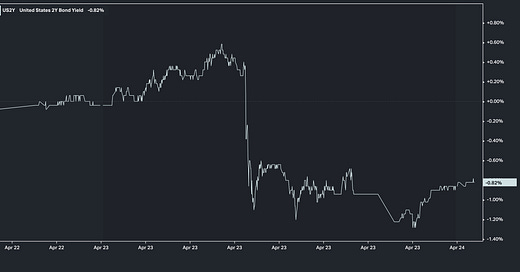Lower Price Pressures
US stocks maintained their upward trajectory on Tuesday, building on the positive momentum from the previous session.
Market sentiment was boosted by optimism surrounding earnings reports, as the S&P 500 climbed 1.2%, the Dow Jones gained 263 points, and the Nasdaq rose 1.6%.
Also, Tesla (1.9%) and Visa (0.7%) are scheduled to release their quarterly results after the closing bell.
Danaher's stock surged 7.1% after the company reported better-than-expected earnings and revenue.
UPS added 2.2%, General Motors' stock jumped 4.6% and GE Aerospace soared 7.5% following upbeat results.
We had a bounce back in stocks. The rally was broad-based but was led, all day, by the Russell 2000 (small caps) - ignited by a weak PMI report the morning.
This U.S. PMI report is based on surveys done by S&P Global on a panel of around 800 companies based in U.S. manufacturing and service sectors. This is a "flash" estimate, which takes about 85% of the responses within the current month. So this is an assessment of April - three weeks into this month, which is the first month of the second quarter.
Here are the takeaways:
"The U.S. economic upturn lost momentum at the start of the second quarter" …
"The more challenging business environment prompted companies to cut payroll numbers at a rate not seen since the global financial crisis (excluding the lockdown period) …
"The deterioration of demand and cooling of the labor market fed through to lower price pressures."
So, slowing growth, weakening labor market, and cooling price pressures. It's only a few weeks, but a continuation of those attributes in the second quarter would absolutely swing the pendulum of Fed rate path expectations back in the other direction.
The weakening view suggests the Fed may get its wish in the coming months, to see a return of the "good inflation readings" they saw in the second half of last year. But the "good inflation readings" this time would be driven by cracks in the job market, which would put the Fed in its familiar position of reactionary policy.
Yields fell sharply on the PMI report …
So, this is "bad news is good news." It relieves pressure in the interest rate market, which is positive for stocks.







